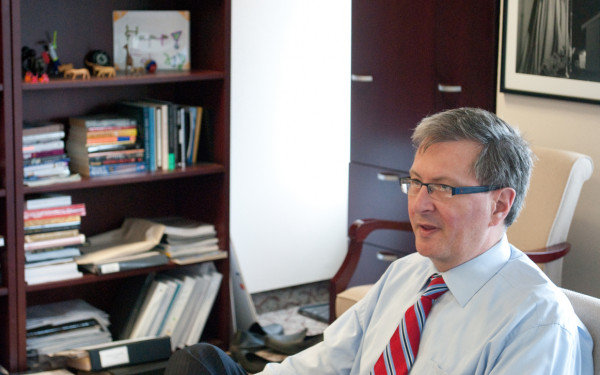No Words From the (Potential) Provost
ConU President Proposes Passing Up on Provost Speech
Concordia President Alan Shepard wants to suspend university bylaws in order to allow provost candidates to forgo the current practice of a required public speech.
Concordia President Alan Shepard wants to suspend university bylaws in order to allow provost candidates to forgo the current practice of a required public speech.
“You want the best pool of applicants you can get,” Shepard said. “You don’t want to jeopardize who will come into the pool.”
Shepard is concerned that applicants might want to keep their candidacy a secret so as to avoid upsetting current employers or co-workers.
“If [candidates] put their hat in the ring and it doesn’t work out, the community they’re a part of now could feel jilted,” he said.
During his own application process at Concordia, Shepard said he considered withdrawing his candidacy when he learned that he would be expected to speak publically. That policy of “parading the president around,” he said, is just not common elsewhere.
The bylaws for any potential provost are even stricter. All short-listed candidates are expected to speak, rather than just the search committee’s top pick.
According to Shepard, the response to the proposal—both during and after the meeting—was positive.
Both he and Board of Governors Chair Norman Hébert, Jr. agreed that the search committee, made up of faculty, students and administrators, adequately represents the community, so it won’t be a huge loss.
But Robert Sonin, president of the Teaching and Research Assistants at Concordia, isn’t as sure.
“The provost is someone who affects the daily life of just about all the faculty. That’s a person that you might want to at least throw a few questions at.”
—Robert Sonin, President of the Teaching and Research Assistants at Concordia
Sonin said that while he’s sympathetic to candidates who risk jobs at home, the tradition of public forums to help pick the next provost is a tradition worth preserving.
“The provost is someone who affects the daily life of just about all the faculty,” he said. “That’s a person that you might want to at least throw a few questions at.”
Shepard brought the recommendation to the Board of Governors during Wednesday’s regular meeting. As per the university’s bylaws, Shepard was giving the required 30-day notice of the motion.
When the motion is actually presented, presumably at the next BoG meeting, it must pass by a two-thirds majority.
And while Shepard is optimistic, he’s not counting on anything.
“A good president never predicts a vote,” he said.
—with files from Riley Sparks

_900_600_90.jpg)



_600_375_90_s_c1.jpg)
_600_375_90_s_c1.jpg)
_900_642_90_600_375_90_s_c1.jpg)